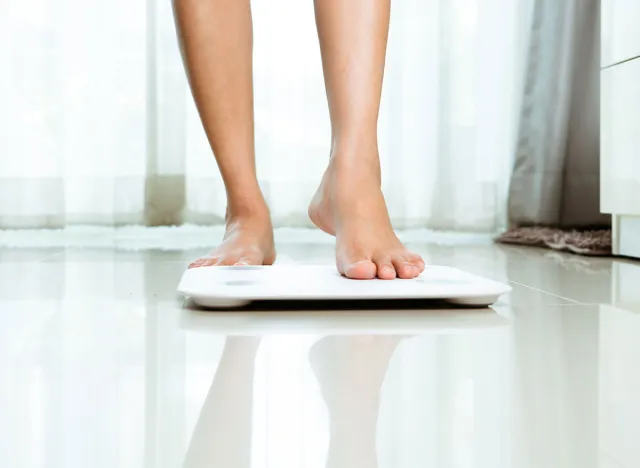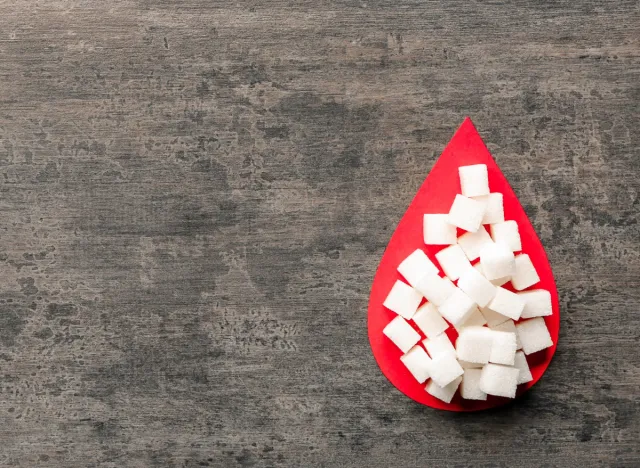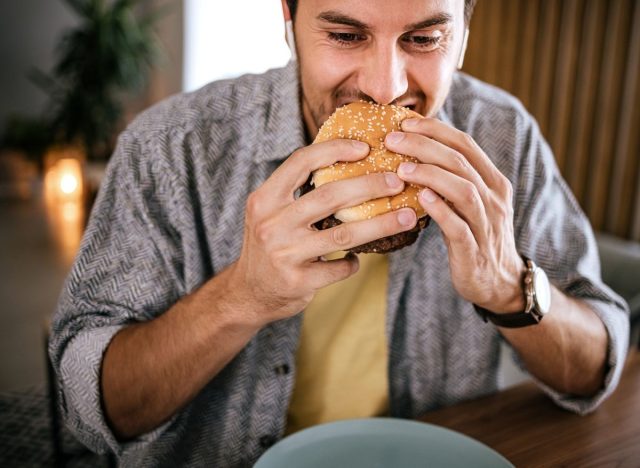8 Warning Signs You're Eating Too Many Carbs

What do cookies, cakes, candy bars, pasta, bread, fruits, and vegetables all have in common? Carbohydrates! While they all belong to the same macronutrient category, not all carbs are created equal. You've likely heard of simple and complex carbs, but understanding the difference can make a big impact on your health.
Here's the breakdown: simple carbs, found in foods like cookies, cakes, candies, and sugary drinks, are quickly digested and cause blood sugar spikes. In contrast, complex carbs—found in fruits, vegetables, whole grains, nuts, and seeds—digest more slowly, providing steady energy. As a dietitian, I recommend prioritizing complex carbs over simple ones for better overall health.
But how do you know if you're eating too many carbs? Ahead, we'll explore how many carbs you should aim for daily, what counts as "too many," and eight warning signs that could indicate you're overdoing it.
In This Article
- How Many Carbs Should You Eat Per Day?
- Signs You May Be Eating Too Many Carbs
- Weight Gain
- High Blood Sugar
- Bloating and Constipation
- Never Feeling Satisfied
- Low Energy
- Skin Breakouts
- Cavities
- Depression
How Many Carbs Should You Eat Per Day?
For someone following a standard 2,000-calorie diet, the 2020-2025 U.S. Dietary Guidelines recommend that 45-65% of your daily calories come from carbs. This translates to about 900-1,200 calories or 225-325 grams of carbs per day.
Carbohydrates are a vital macronutrient because they serve as the body's primary energy source, fueling everything from daily activities to brain function. They're also found in some of the healthiest foods we should be eating more of, like fruits and vegetables. Not eating enough carbs can lead to low energy, brain fog, and a bad mood.
However, carb needs vary greatly depending on factors like medical history, activity level, and health goals. For a personalized recommendation, it's best to consult with a registered dietitian.
Signs You May Be Eating Too Many Carbs
If you're not very active or exceeding the recommended amount of daily carbs, you could be consuming too many. While it can be challenging to pinpoint, here are eight signs that might suggest you're overdoing it on carbs.
Weight Gain

Ever notice your clothes feeling a bit snug or the number on the scale creeping up? Consuming too many simple carbs—like pizza, chips, and sweet treats—can lead to weight gain. These refined carbs are often easy to overeat and lack essential nutrients. Let's be honest, when was the last time you measured out a proper serving of chips? Chances are you've found yourself mindlessly munching straight from the bag.
Research back this up. One study found that increasing daily intake of starch or added sugar by just 100 grams (about 3.5 ounces) was linked to a weight gain of 2 to 3.3 pounds over four years. While 100 grams may sound like a lot, it's surprisingly easy to reach. For example, 100 grams of pasta is roughly 1½ servings, an amount that many of us already pile on our plates.
On the flip side, the same study also showed that participants who increased their intake of whole grains, fruits, and vegetables experienced weight loss. This shows the importance of prioritizing fiber-rich, complex carbs to support a healthy weight.
High Blood Sugar

Whether you're sipping on sweet tea, cracking open a soda, slurping down a Frappuccino or noshing on cookies, refined carbs can cause your blood sugar to spike. When you eat carbs, your body breaks them down into glucose, a form of sugar that enters your bloodstream. Glucose is essential for fueling your body, but consuming too much and not the right kind can lead to constant spikes. This overtime can lead to high blood sugar levels, triglycerides and chronic health conditions like type 2 diabetes.
To support balanced blood sugar levels, limit sugary treats and opt for complex carbs like whole grains and fruits instead.
Bloating and Constipation

Feeling bloated or backed up? Eating too many refined carbs, like white bread and sugary snacks, can crowd out fiber-rich foods that support healthy digestion.
Foods high in fiber, such as fruits, vegetables, whole grains, nuts and seeds are essential for keeping things moving smoothly. Fiber not only prevents constipation but also promotes the growth of healthy gut bacteria and helps food move more easily through your digestive tract preventing bloating.
If your diet is heavy on refined carbs, try swapping them for fiber-packed options. For example, swap crackers or pretzels for an apple or celery sticks.
Never Feeling Satisfied

Feel like you're always hungry even after just finishing a meal? It might be because you're eating too many refined carbs, which don't do a good job of keeping you full. Refined carbs lack the fiber and water content that promote fullness and feelings of satiety.
For example, one cup of cooked oatmeal (a complex carb) is 83% water, plus 4 grams of filling fiber and 5 grams of protein – perfect for keeping you full longer. On the other hand, one cup of frosted flakes (a refined carb) has only 1 gram of fiber and 2 grams of protein, so you'll likely be reaching for seconds or a snack shortly after.
To stay satisfied for longer, choose fiber-filled, water-packed food like fruits (such as melons, berries, apples) and veggies (think leafy greens, cucumbers, celery).
Low Energy

If your plate is mostly filled with refined carbs, you might be missing out on important energy-boosting nutrients found in protein-rich foods. Nutrients like iron, which is found in beef, seafood, lentils, and beans, help shuttle oxygen throughout the body and support energy levels. Eating too many refined carbs and not enough protein-rich foods can lead to feelings of fatigue, and potential micronutrient deficiencies.
Skin Breakouts

We all want dewy, radiant, blemish-free skin, but when a pimple pops up, it's easy to blame your skin-care routine. But before you toss your multi-step regimen out the window, take a closer look at your diet, it could be to blame.
Science shows that high-glycemic foods like sugary snacks and refined carbs, are a likely culprit behind recurring breakouts. These foods can cause inflammation which causes acne and can even worsen it.
Cavities

Going to the dentist isn't exactly everyone's favorite activity, and according to a survey about one-third of Americans avoid it altogether. Yet research tells us eating too much sugar (aka refined carbs) is the leading cause of cavities. Experts recommend limiting sugar intake to protect your smile.
American Dental Association explains when you eat carb-rich foods, bacteria in your mouth feed on them and produce acids, which weakens enamel. This can lead to damage to your pearly whites and cause cavities over time.
Depression

New research has found a link between high sugar intake and increased risk of depression in adults, suggesting that consuming too much sugar may negatively impact mental health. While depression should always be addressed by a professional, making dietary changes like reducing sugar may help.
On the other hand, other studies also show that eating colorful, nutrient dense foods like fruits and veggies can actually boost your mood. Eating eight or more servings of fruits and vegetables each day resulted in people feeling happier, improved their well-being, and feelings of satisfaction. So don't forget to grab something colorful today!
- Source: https://www.dietaryguidelines.gov/sites/default/files/2020-12/Dietary_Guidelines_for_Americans_2020-2025.pdf
- Source: https://www.eatthis.com/signs-you-should-be-eating-more-carbs/
- Source: https://pmc.ncbi.nlm.nih.gov/articles/PMC10523278/
- Source: https://fdc.nal.usda.gov/food-details/2708380/nutrients
- Source: https://smartlabel.kelloggs.com/Product/Index/00038000199042
- Source: https://ods.od.nih.gov/factsheets/Iron-HealthProfessional/
- Source: https://pmc.ncbi.nlm.nih.gov/articles/PMC8971946/
- Source: https://www.biospace.com/dentavox-over-60-percent-of-people-worldwide-suffer-from-dental-fear-4-percent-have-never-visited-a-dentist
- Source: https://pmc.ncbi.nlm.nih.gov/articles/PMC9020561/
- Source: https://www.ada.org/resources/ada-library/oral-health-topics/nutrition-and-oral-health
- Source: https://pmc.ncbi.nlm.nih.gov/articles/PMC10851576/
- Source: https://pmc.ncbi.nlm.nih.gov/articles/PMC4940663/









